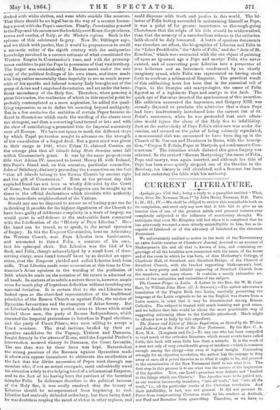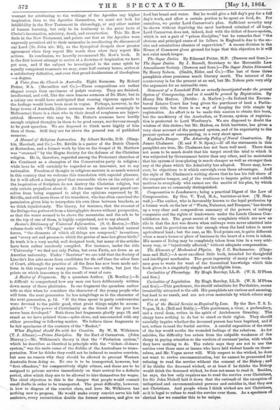The Nature and Extent of .Divine Inspiration, as Stated by
the Writers and Deduced from the Facts of the New Testament. By the Rev. C. A. Row, M.A. (Longman and Co.)—To any one who has been compelled to read much of the orthodox literature which recent events have called forth, this book will seem little less than a miracle. It is the work of a man not only of very considerable grasp of intellect —which is common enough among the clergy—but even of logical insight. Contending strongly for an objective revelation, the author has the courage to fling away at once all a priori theories as to what it ought to be, and proceed to the examination of the New Testament itself to see what it is. The first step in this process is to see what was the nature of the inspiration of the Apostles. Now, our Lord's promises were definite and "limited to the things which are Christ's." The Apostles wore to be guided not, as our version incorrectly translates, "into all truth," but "into all the truth," i.e., all the particular truths of the Christian revelation. And their infallibility, in fact, was not general. It did not prevent St. Peter from compromising Christian truth by his conduct at Antioch.," nor Paul and Barnabas from quarrelling. Therefore, as we have no
warrant for attributing to the writings of the Apostles any higher inspiration than to the Apostles themselves, we must not look for infallibility in the New Testament in chronology, or any other matter of human learning, but only in its testimony to the great facts of Christ's incarnation, ministry, death, and resurrection. This Mr. Row finds in the New Testament, and points out that as the Apostles were expressly promised aid to their memories in recollecting the discourses of our Lord (St. John xiv. 26), so the Synoptical Gospels show greater agreement when they report His words than when they report His actions. In conclusion, we heartily recommend Mr. Row's book. It is the first honest attempt to arrive at a doctrine of inspiration we have yet seen, and if the subject be investigated in the same spirit by equally competent reasoners we may, some half century hence, arrive at a satisfactory definition, and oven that grand desideratum of theologians —a dogma.































 Previous page
Previous page